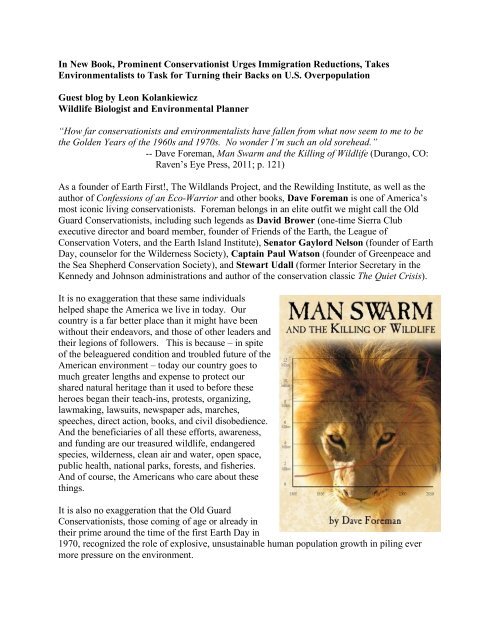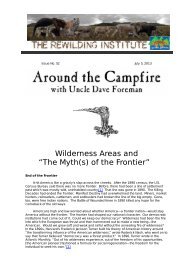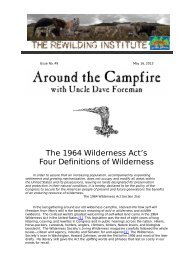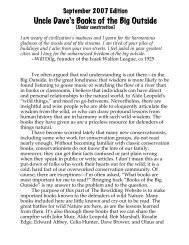Man Swarm review by Leon Kolankiewicz - The Rewilding Institute
Man Swarm review by Leon Kolankiewicz - The Rewilding Institute
Man Swarm review by Leon Kolankiewicz - The Rewilding Institute
You also want an ePaper? Increase the reach of your titles
YUMPU automatically turns print PDFs into web optimized ePapers that Google loves.
In New Book, Prominent Conservationist Urges Immigration Reductions, Takes<br />
Environmentalists to Task for Turning their Backs on U.S. Overpopulation<br />
Guest blog <strong>by</strong> <strong>Leon</strong> <strong>Kolankiewicz</strong><br />
Wildlife Biologist and Environmental Planner<br />
“How far conservationists and environmentalists have fallen from what now seem to me to be<br />
the Golden Years of the 1960s and 1970s. No wonder I’m such an old sorehead.”<br />
-- Dave Foreman, <strong>Man</strong> <strong>Swarm</strong> and the Killing of Wildlife (Durango, CO:<br />
Raven’s Eye Press, 2011; p. 121)<br />
As a founder of Earth First!, <strong>The</strong> Wildlands Project, and the <strong>Rewilding</strong> <strong>Institute</strong>, as well as the<br />
author of Confessions of an Eco-Warrior and other books, Dave Foreman is one of America’s<br />
most iconic living conservationists. Foreman belongs in an elite outfit we might call the Old<br />
Guard Conservationists, including such legends as David Brower (one-time Sierra Club<br />
executive director and board member, founder of Friends of the Earth, the League of<br />
Conservation Voters, and the Earth Island <strong>Institute</strong>), Senator Gaylord Nelson (founder of Earth<br />
Day, counselor for the Wilderness Society), Captain Paul Watson (founder of Greenpeace and<br />
the Sea Shepherd Conservation Society), and Stewart Udall (former Interior Secretary in the<br />
Kennedy and Johnson administrations and author of the conservation classic <strong>The</strong> Quiet Crisis).<br />
It is no exaggeration that these same individuals<br />
helped shape the America we live in today. Our<br />
country is a far better place than it might have been<br />
without their endeavors, and those of other leaders and<br />
their legions of followers. This is because – in spite<br />
of the beleaguered condition and troubled future of the<br />
American environment – today our country goes to<br />
much greater lengths and expense to protect our<br />
shared natural heritage than it used to before these<br />
heroes began their teach-ins, protests, organizing,<br />
lawmaking, lawsuits, newspaper ads, marches,<br />
speeches, direct action, books, and civil disobedience.<br />
And the beneficiaries of all these efforts, awareness,<br />
and funding are our treasured wildlife, endangered<br />
species, wilderness, clean air and water, open space,<br />
public health, national parks, forests, and fisheries.<br />
And of course, the Americans who care about these<br />
things.<br />
It is also no exaggeration that the Old Guard<br />
Conservationists, those coming of age or already in<br />
their prime around the time of the first Earth Day in<br />
1970, recognized the role of explosive, unsustainable human population growth in piling ever<br />
more pressure on the environment.
In contrast, with precious few exceptions, at least in<br />
their public postures, contemporary leaders of the<br />
politically correct Environmental Establishment either<br />
tend to ignore U.S. overpopulation altogether (their<br />
preferred strategy), or when pressed, actively dismiss or<br />
minimize its role as a causative agent of greater<br />
environmental impacts. (At the same time, in a hushed<br />
tone or whisper, some may tell you that of course<br />
population is a huge issue, but it’s also a radioactive one<br />
that they and their organization must avoid at all costs.)<br />
<strong>The</strong> endangered Northern<br />
Aplomado Falcon – a favorite of<br />
Foreman’s in his native New<br />
Mexico<br />
By the Environmental Establishment, I mean the wellfunded,<br />
well-connected, politically potent, big national<br />
environmental groups. I mean advocacy groups such as<br />
the Sierra Club, National Wildlife Federation,<br />
Greenpeace, Wilderness Society, Environmental<br />
Defense Fund, Friends of the Earth, National Audubon<br />
Society, Natural Resources Defense Council, <strong>The</strong><br />
Nature Conservancy, League of Conservation Voters,<br />
U.S. Public Interest Research Group, World Wide Fund<br />
for Nature (WWF) and the Union of Concerned<br />
Scientists. I also mean federal agencies like the<br />
Environmental Protection Agency (EPA) and countless<br />
state counterparts.<br />
A favorite haunt of the Aplomado Falcon and Dave Foreman – the<br />
Chupadera Wilderness of Bosque del Apache National Wildlife<br />
Refuge in New Mexico, with the Rio Grande visible
In his new book, <strong>Man</strong> <strong>Swarm</strong> and the Killing of Wildlife, Dave Foreman lends his own vigorous<br />
voice – and his barbed pen – on behalf of the imperiled and voiceless fellow creatures with<br />
which we share our nation and our planet. <strong>The</strong>se critters, or wildeors as Foreman calls them in<br />
Old English, cannot vote, contribute to political campaigns, or purchase products, so unless<br />
pressed, neither politicians nor businessmen will pay them any heed. Foreman both instructs us<br />
as to why ever more people means ever less<br />
wildlife, and he assails spineless or clueless<br />
environmentalists for not recognizing reality and<br />
for not doing anything about it.<br />
Few living environmental activists, conservation<br />
biologists, or environmental historians can match<br />
the combined breadth and depth of Dave<br />
Foreman’s knowledge of both ecological science<br />
and recent and past conservation history. And still<br />
fewer writers/activists have actually contributed to<br />
making and shaping recent environmental history<br />
to the extent he has.<br />
Even as Foreman treats all of the grim statistics<br />
about approaching mass extinctions and the like<br />
with all of the gravity – and deep dismay – they<br />
deserve, he is still a pleasure to read. He has an<br />
<strong>The</strong> endangered jaguar, a stealthy<br />
wild cat of the American tropics<br />
whose range extends north into<br />
Arizona and New Mexico<br />
avuncular, self-deprecating manner; indeed, the <strong>Rewilding</strong> <strong>Institute</strong> distributes a periodic column<br />
to his supporters called “Uncle Dave Foreman’s Around the Campfire.” In <strong>Man</strong> <strong>Swarm</strong>, he<br />
excoriates with equal relish the fatuous cornucopians of both Left and Right political persuasions<br />
who deny overpopulation.<br />
Representing the Right, the late Professor Julian Simon, the “guru of growth,” who declared in<br />
1994:<br />
We now have in our hands – in our libraries, really – the technology to feed, clothe, and<br />
supply energy to an ever-growing population for the next 7 billion years.<br />
Foreman on Simon’s feckless and reckless claim: “University of Colorado physics professor<br />
emeritus Al Bartlett writes that some of his friends quizzed Julian Simon after his seven-billion<br />
year wisecrack and Simon backtracked that he meant only seven million years. (Be glad this guy<br />
wasn’t doing your taxes!)”<br />
Standing in for leftie cornucopians, former socialist presidential candidate, anti-pollution<br />
crusader and <strong>The</strong> Closing Circle author Barry Commoner, who wrote:<br />
It is a totally spurious idea to claim that rising population anywhere in the world is<br />
responsible for the deteriorating environment.
Foreman correctly observes that when it comes to their views on human growth without limit,<br />
these opposite ends of the political spectrum – both hard-core Right and Left, Libertarianism and<br />
Marxism – are remarkably similar. “<strong>The</strong>y both see Earth as an overflowing warehouse for<br />
industrial civilization, a warehouse that is never empty,” Foreman writes.<br />
Foreman wields his cudgel more for the left-wingers, however, since they have been far more<br />
influential in pulling their fellow travelers in the environmental community away from the<br />
population stabilization cause – under threat of shunning or excommunication. And Foreman<br />
acknowledges forthrightly that the main reason for this is what he calls the “Bugbear of<br />
Immigration:”<br />
Conservationists and others won’t work on growth in the United States until we deal<br />
forthrightly with immigration. We can’t do that until we make a new playing field where<br />
we can talk about immigration without being damned to hell <strong>by</strong> erstwhile friends who say<br />
we are anti-immigrant.<br />
And:<br />
…unless we cap immigration to the United States, we cannot keep from doubling or<br />
nearly tripling today’s U.S. population <strong>by</strong> 2100. You might not like this hand, but it is the<br />
hand we are dealing ourselves.<br />
If other American conservation leaders had the courage, common sense, and plain speech of<br />
Dave Foreman instead of the cunning and deceit purveyed <strong>by</strong> the counselor Wormtongue in<br />
Tolkien’s Lord of the Rings, America’s wildlife and wild places would stand a much better<br />
chance of surviving this hard new century.<br />
Foreman goes on to offer his own wide-ranging recommendations on how to cap immigration to<br />
the U.S., some of which may strike NumbersUSA supporters as familiar, and others as original,<br />
radical, or unrealistic. But they represent fresh, outside-the-box thinking on the immigration<br />
issue <strong>by</strong> a free-thinking and innovative conservation ally.<br />
Not content to lament, and definitely not a passive prisoner of folly, fatalism, and futility,<br />
Foreman closes <strong>Man</strong> <strong>Swarm</strong>, with a 32-page chapter called, “What Do We Do?” Here he<br />
furnishes an even wider-ranging array of actions that disturbed conservationists can take, from<br />
the personal to the political.<br />
I hope I’ve whetted your appetite for this book – it behooves you to buy it, read it, digest it…and<br />
act.<br />
And from Uncle Dave Foreman’s <strong>Man</strong> <strong>Swarm</strong>, the final word:<br />
Those environmentalists, who think we can double or triple U.S. population without<br />
wiping out wildlife and scalping our last wildernesses, are living in a fool’s paradise –<br />
not in the real world where we either will or will not keep the other Earthlings [wildlife]<br />
hale and hearty in our shared neighborhoods.





